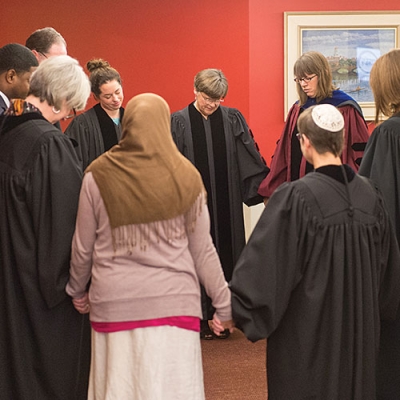By Lucy A. Forster-Smith
 As a newcomer to Harvard University I have experienced a robust sense of welcome from many quarters of the campus. From the custodial staff in Memorial Church knowing my morning coffee routine, to delicious invitations into homes for warm conversations and a spicy meal, to the lovely surprise of gorgeous floral bouquets, Harvard knows how to open its doors to the newcomer. But the welcome doesn’t stop with the hospitality extended to a newly arrived chaplain. A few months ago we welcomed to the Yard the Class of 2018. We all pulled out the stops (literally) to make sure these precious young souls were greeted, taken across the College threshold to their Entryways, met by a caring and competent staff of tutors, proctors, house deans, not to mention brilliant faculty and attentive staff. I was aware of a palpable joy that exuded from the community as the spiffed up Yard received an eager new class.
As a newcomer to Harvard University I have experienced a robust sense of welcome from many quarters of the campus. From the custodial staff in Memorial Church knowing my morning coffee routine, to delicious invitations into homes for warm conversations and a spicy meal, to the lovely surprise of gorgeous floral bouquets, Harvard knows how to open its doors to the newcomer. But the welcome doesn’t stop with the hospitality extended to a newly arrived chaplain. A few months ago we welcomed to the Yard the Class of 2018. We all pulled out the stops (literally) to make sure these precious young souls were greeted, taken across the College threshold to their Entryways, met by a caring and competent staff of tutors, proctors, house deans, not to mention brilliant faculty and attentive staff. I was aware of a palpable joy that exuded from the community as the spiffed up Yard received an eager new class.
Through these first months at Harvard I have been acutely aware of the importance of hospitality especially when great uncertainty abounds. I have come to realize that there may be no more important place for hospitality than this grand, spacious, sacred space known as the Memorial Church.
There are certainly those who wonder what role a Church has in a secular academy such as Harvard. Perhaps the central role of this church is to be a space of radical hospitality. Memorial Church offers such hospitality in many ways. I suggest three. First, the Memorial Church is just that, a place of memory. It was given as a memorial to those who lost their lives in World War I. It extends the memory by offering a space for services that recall the contribution of alumni, friends, faculty, and staff of the University. History has the function of engendering trust and engaging the customs that shape the culture. Like families have their traditions and customs, so also this Church has practices that influence our life together. Honoring those is an act of hospitality.
Second, the Church’s hospitality not only extends to the past but it opens each day as an anchoring presence. Whether those who enter the Church are visitors who come to Harvard to rub John Harvard’s foot and then turn the corner and stumble into the inner sanctum of the Church’s sanctuary; or are students who gather on a crisp autumn evening to mourn the passing of a classmate whose life was cut short by an accident; whether the light shines brightly at Morning Prayers or through the brilliant words of a rabbi who is the preacher for the day, the days and weeks of our lives are moored to the place in surprising ways. Even for the most cynical, the shimmering sanctum of the Church may catch the heart unaware.
A third response to the question about the role of a church on a secular campus centers less on the building and more on the way the Memorial Church is a place that offers and equips the campus community in practices of hospitality. The 13th Century Persian poet Rumi speaks of this in his poem, The Guest House. He says, “This being human is a guest house. Every morning a new arrival. A joy, a depression, a meanness, some momentary awareness comes as an unexpected visitor.” And the response? “Welcome and entertain them all…meet them at the door laughing, and invite them in. Be grateful for whoever comes, because each has been sent as a guide from beyond.” What would the Memorial Church be with its doors flung open to students in residences such as Canaday, Thayer, Wigglesworth? What would it be like to step out onto the porch with our hands and hearts open to the campus of which it is a part? How is radical hospitality connected with the Church’s activity of pricking the conscience of the Harvard community to sew justice and peace into the human fabric? How can this Church hold the hurt, the fear, the uncertainty and the delight and laughter of children, older adults, the bold and the shy? The vision of a campus church for the 21st Century is one that begins with gratitude for the infusing energy of past and present and one that leans forward to the future, awaiting the guiding light of the Holy Splendor who invites, guides and readies us for all who step across the threshold. It is a place of deep welcome and a space of gracious sending. It is a setting for illumination and also one that quenches the deepest thirst of a human community. And it brims with joy and laughter, a holy welcome for all kindred. This is a radical place of holy hospitality.
